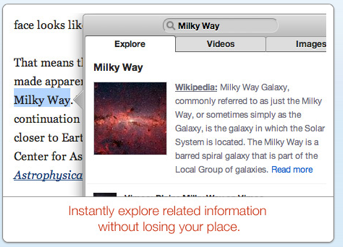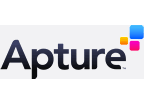Google has acquired Apture, a startup that brings instantaneous search to content on the web, we’ve confirmed with both companies. Financial terms of the deal were not disclosed. Launched in 2008, Apture has raised $4.6 million from Beau Vrolyk, Paul Maritz, Steve Taylor, Clearstone Venture Partners
Co-founded by Tristan Harris and Can Sar, Apture developes ‘Apture Highlights,’ a browser extension that aims to plug the “search leak” that the company says is taking place with content on the web. Apture highlights a search leak as when a users is reading content, wants more information about a keyword or phrase and then opens another browser tab to search for the information on Google, Bing or Yahoo. The downside for the content publisher is that the user disengages with the actual content by leaving the page.
Apture Highlights allows you to highlight any word or phrase on a page and instantly bring up search results in a window. The startup brings results from 60-plus sources including YouTube, Twitter, Wikipedia, Google and more for extra context around content. The browser add-on is available for Chrome, Firefox and Apple’s Safari browsers. In fact, more than a billion pages a month are enhanced with Apture, says Harris.
Apture’s business model also offered publishers a white-label version of Apture Highlights, which is being used by Scribd, The Financial Times, Reuters, Economist.com, ScientificAmerican, BleacherReport.com, and Times of India. Publisher simply insert a line of Javascript code, and readers can then access an HTML-based overlay that acts like a minitiature browser that enables readers to find and explore related multimedia content without leaving the original page.
The virtue of using the technology for publishers is that content sites are increasing their search volume and site page views by driving traffic to related articles for every search. Consumers actually stay on a publisher page with Apture two to three times longer than without the plug-in.
 The company also recently launched HotSpots, which allows Apture to populate hyperlinks on the fly on any page on the web. Publishers have to add one line of code and hyperlinks will appear for readers without publishers having to link. The links point to Apture overlays which give a range of data to a reader without them having to leave the page: Wikipedia, CrunchBase, search results, maps, etc.
The company also recently launched HotSpots, which allows Apture to populate hyperlinks on the fly on any page on the web. Publishers have to add one line of code and hyperlinks will appear for readers without publishers having to link. The links point to Apture overlays which give a range of data to a reader without them having to leave the page: Wikipedia, CrunchBase, search results, maps, etc.
In an interview today, Harris explained that when he started the company back in 2007, he felt that there was an incredible opportunity within the medium of the web to find contextual information to help you understand what you are looking at on a webpage. Harris wanted Apture to become part of the ‘fabric of the web’.
But in the past few years, Harris says that he realizes that the browseritself is part of the medium that will shape how information is really accessible. “You can’t talk about making information accessible without talking about the web browser,” he explains.
With that thought in mind, when Google approached Harris and the company over the past few months with an acquisition offer, the integration made sense. Combined with google’s own mission of making information accesible, “the Chrome platform has 200 active million users a month and that’s a huge scale that Apture’s technology could reach,” says Harris.
Google says of the acquisition, “We were impressed by the Apture team’s approach to enhancing the web browser experience, and we think their expertise will complement the Chrome team’s efforts in this area.”
The Apture team, which is composed of ten employees, will be joining the Google Chrome team improve user experience. Google says that Apture’s plug-ins and white-label technology will be shut down within next month or so.
 Harris says, “We’re bringing all things we’ve been doing and a lot more to the Chrome team. With the growth of Chrome as a browser, it’s clear why this acquisition make so much sense, and who else would you want to partner with to the change-up fabric of the internet? We’re going to make browsing much more than it’s ever been and it’s really exciting.”
Harris says, “We’re bringing all things we’ve been doing and a lot more to the Chrome team. With the growth of Chrome as a browser, it’s clear why this acquisition make so much sense, and who else would you want to partner with to the change-up fabric of the internet? We’re going to make browsing much more than it’s ever been and it’s really exciting.”
For Google, this is also a bit of a talent acquisition as well. Harris previously worked in the user interface engineering world of Apple, where he has two pending patents. He helped build the first ad server for Wikia, was also a Mayfield Fellow with the Stanford Technology Ventures Program and dropped out of the Stanford Computer Science Masters program to start Apture. Sar is also on a leave of absence from the Stanford Computer Science PhD program and has published several academic papers in Operating Systems and Security, and is the author of several pending patents.
All around, the acquisition is a win for Google. It was only a matter of time before a web giant like Google or Facebook snapped up the startup, and it doesn’t hurt to add a number of talented developers and engineers as well.
